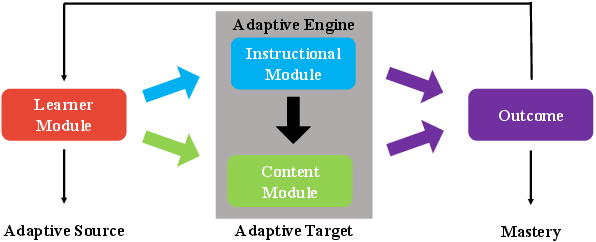- The paper shows that integrating generative AI into adaptive learning systems can improve content personalization and real-time response accuracy.
- The methodology leverages LLMs and diffusion models to generate customized learning paths and automate knowledge tracing.
- The study highlights challenges such as AI hallucination and fairness concerns while outlining pathways for innovative educational practices.
Summary of "Bringing Generative AI to Adaptive Learning in Education"
The paper "Bringing Generative AI to Adaptive Learning in Education" (2402.14601) discusses the integration of generative AI (GenAI) technologies into adaptive learning (AL) systems within education. This integration is aimed at improving learning efficiency and personalization by leveraging the capabilities of GenAI, especially with the advances in LLMs and diffusion models. The paper outlines the advantages and challenges of this approach, reviews related works, and provides insights into future developments in the field of education through GenAI-enhanced adaptive learning systems.
Introduction
The paper begins by defining GenAI as AI models capable of creating new content by learning from existing data. Unlike traditional ML models focused on data analysis, GenAI generates original outputs applicable to complex problems. The emergence of techniques such as LLMs and diffusion models has expanded GenAI's applicability across domains including science, finance, and education.
AL, a technological innovation in education, has been validated for its pedagogical benefits, including personalized learning paths that accommodate learners' individual differences. AL systems employ ML techniques to analyze learners' behavior and tailor educational content accordingly.
Background
Adaptive Learning (AL)
AL addresses the limitations of one-size-fits-all educational approaches by providing customized experiences tailored to learners' individual needs. AL systems typically consist of a learner, content, and instructor modules, each playing a distinct role in delivering personalized education.

Figure 1: An Illustration of Adaptive Learning (AL).
Generative AI (GenAI)
GenAI encompasses advanced modeling techniques like GANs, VAEs, and Transformers. These technologies have revolutionized areas like NLP and CV by enabling the generation of human-like problem-solving outputs. In education, LLMs exhibit excellent context understanding necessary for responding dynamically to students' learning needs.
Machine Learning in Adaptive Learning
ML plays a critical role in AL through algorithms that track learners' performance and predict their future responses (knowledge tracing). It also aids in constructing hierarchical knowledge structures and generating individualized learning paths.
Knowledge Tracing (KT)
KT is pivotal for diagnosing student proficiency and guiding subsequent learning activities. Traditional KT uses Bayesian models and factor analysis, while recent efforts leverage deep learning architectures like RNNs to improve prediction accuracy.

Figure 2: Knowledge Tracing Diagram.
Knowledge Concepts Structure Construction
Hierarchical frameworks of knowledge concepts facilitate efficient content delivery. ML methods, including supervised and unsupervised extraction techniques, automate the organization of educational content within these structures.
Learning Path (LP) Generation
ML approaches tailor LPs to meet learners' preferences, characteristics, and goals, using learner-based and structure-based methods to recommend efficient learning paths.

Figure 3: Learning Path Generation Diagram.
Bringing GenAI to Adaptive Learning
The integration of GenAI offers advancements in content generation, multimodal data processing, and improved generalization in AL systems. These capabilities enhance AL's adaptability and personalization, providing real-time tailored educational experiences.
Benefits and Strengths
GenAI's prowess in crafting nuanced, diversified responses can revolutionize KT and LP recommendations, making them more interactive and precise. Moreover, its ability to handle multi-modality broadens the scope for understanding learners' emotional and cognitive states.
Industrial Practice
Several leading educational institutions have started implementing GenAI in their adaptive learning products, focusing on highly personalized user experiences and leveraging GenAI's strengths to boost learning outcomes.
Disadvantages, Challenges, and Potentials
Despite GenAI's strengths, challenges such as hallucination, dependency, and fairness concerns must be addressed to ensure ethical and effective implementation. Research should focus on mitigating these issues to maximize GenAI's educational impact.

Figure 4: Human-centric Coevolution of GenAI and Education.
Conclusion
The paper advocates for the integration of GenAI into AL to enhance and expand current educational technologies. This integration promises to catalyze educational transformation while posing challenges that necessitate continued research. These challenges offer opportunities for innovations that could redefine adaptive learning for the future. By addressing fairness, reliability, and other concerns, GenAI-driven AL systems can attain broader application and acceptance, making education more accessible and effective.
The researchers stress that the integration of GenAI into AL systems is a complex, yet promising venture, urging a balanced approach to its implementation to ensure that it positively influences educational methodologies while fostering innovative research directions.





